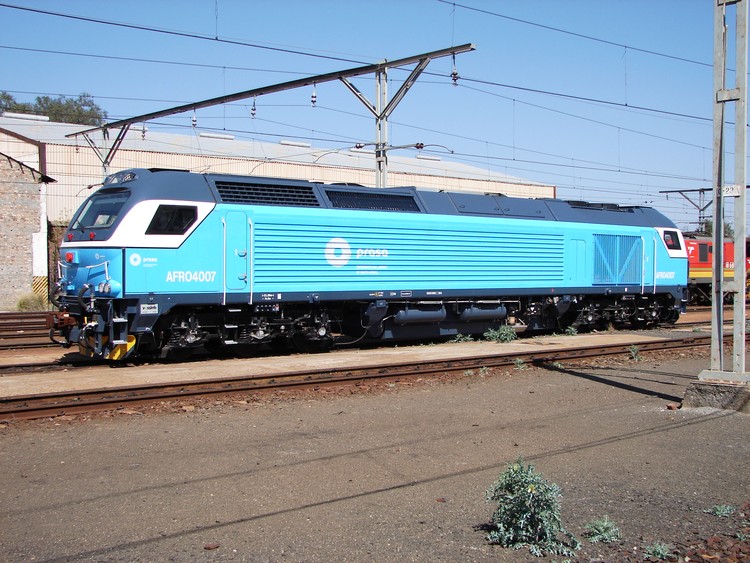
3 October 2024
The too-tall “AFRO-4000” locomotive, supplied to PRASA by the Spanish arm of German rail company Vossloh, via Swifambo, a front company. Archive photo: Col André Kritzinger, CC BY-SA 3.0
Families hoping to travel across the country by rail over the December holidays will need to make other plans. The Passenger Rail Agency of South Africa (PRASA) has told GroundUp that all but one of its long-distance routes have been suspended, with no clear commitment on when services will resume.
The only route that will be operating over the December–March peak season will be between Johannesburg to East London, according to PRASA.
Rail activist group #UniteBehind believes the problems with long distance train services are a direct result of corruption at PRASA over the years.
Shosholoza Meyl, which handles PRASA’s long distance train services, has had its trains out of service in Gauteng and the Western Cape since 2020, when it was shut down on the Railway Safety Regulator’s instructions after a fatal crash outside Johannesburg.
It ran four routes: Johannesburg to Durban, Johannesburg to Musina via Polokwane, Johannesburg to Cape Town, and Johannesburg to East London.
It initially resumed with limited operations in 2022 on two routes: Johannesburg to East London and Johannesburg to Musina.
The Johannesburg to Durban and Johannesburg to Cape Town routes resumed in December 2023. But these trips were plagued by problems and delays of several hours in some cases.
Now PRASA says it has to cut three of its four routes because there aren’t enough locomotives.
According to PRASA spokesperson Andiswa Makanda, the locomotives it had been using were “old, unreliable and constantly broke down”.
The Shosholoza Meyl is cheaper than other modes of long-distance transport. A single third-class ticket costs from R430 and first class is R650 on the Johannesburg–Cape Town route, compared to a taxi or a bus that costs an average of R1,000 per trip. Flights cost more.
On the Johannesburg–Cape Town route, Makanda said vandalism, cable theft and severe flooding had negatively impacted infrastructure in recent months.
In December, Shosholoza Meyl ran one trip on this route, however, it was cut short when the train never made it to Cape Town due to cable theft and vandalism.
The inter-provincial rail network belongs to Transnet, PRASA said.
Another trip scheduled for 24 July was cancelled at the last minute, Makanda said, because floods has washed away the railway tracks between De Doorns and Worcester.
For this route to run again, the rail agency will need a minimum of four locomotives. Currently there are none in the province.
“No fixed date on service resumption can be given at this stage due to a pending court process that may give direction to Swifambo liquidators on how to disperse locomotives that are within the Swifambo estate,” said Makanda, referring to PRASA’s controversial Swifambo deal.
The East London–Johannesburg line will operate long distance services. Archive photo: Steve Kretzmann
Since 2017, #UniteBehind has been calling for the prosecution of senior officials at the rail agency who were involved in the Swifambo tender. PRASA bought locomotives in what came to be known as the “too-tall trains” deal. The deal was not just corrupt, the locomotives, which were meant to service long-distance routes, exceeded the maximum height for most of South Africa’s lines.
PRASA paid R2.7-billion to Swifambo, the front company for locomotive manufacturer Vossloh. Swifambo transferred R1.8-billion to Vossloh. In return, PRASA received 13 locomotives, none of which could be operated safely.
Now the liquidators of Swifambo have applied to the High Court in Pretoria to get permission to dispense its assets, which include the locomotives. The matter “seeks to give PRASA the locomotives as dividend in specie [instead of cash] that were acquired by Swifambo before the contract was set aside by the High Court”.
Makanda said PRASA supports the application.
She told GroundUp the service will resume as soon as they’ve secured enough locomotives.
Meanwhile, #UniteBehind legal officer Joseph Mayson criticised PRASA’s decision to persist with procuring the Vossloh locomotives.
Mayson said PRASA “trying to procure these locomotives, which they believe they can modify to fit South Africa’s needs, … seems highly unlikely to work”.
“The greed of former PRASA executives and management has impacted most heavily on the poor. People are unable to visit relatives, search for jobs, or enjoy vacations due to the high cost of alternative travel. This is one of the most shameful stories of corruption from the time of deep state capture,” said Mayson.
PRASA’s Makanda, however, said, “It was not procuring locomotives.”